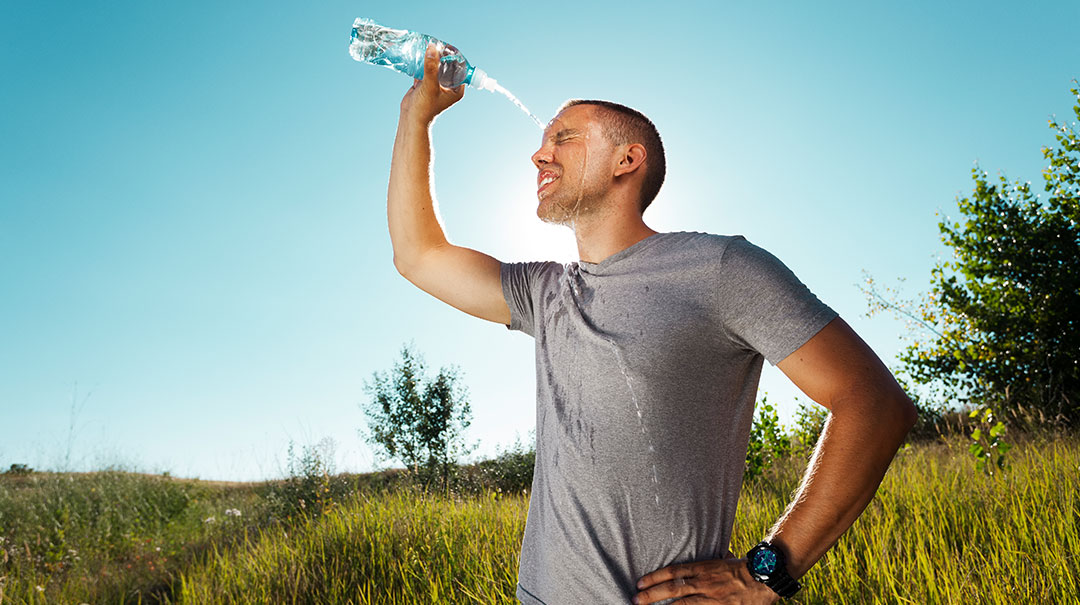If you spend time outside during the summer, there’s a good chance you’ve experienced a sunburn or become dehydrated. Both scenarios can result in health implications, such as skin cancer down the road—due to ultraviolet (UV) radiation from the sun—or a heat injury, ranging from mild heat cramps to heat exhaustion or even heat stroke.
You can avoid health implications of too much sun exposure by protecting your skin and staying hydrated. Read on for four of my favorite recommendations.
1. Seek Shade When the Sun is Strongest
Ultraviolet (UV) radiation from the sun is the leading cause of skin cancer, the most common cancer in the U.S. UV rays are strongest between 10 a.m. and 3 p.m., so it’s important to plan your day with this in mind (although, this often can be the busiest time of our days).
If you have plans to go for a jog, spend time at the lake or beach, or go fishing, make sure to seek shade during these peak times.
2. Wear the Right Clothing and Accessories
Wearing the right clothing is one of the best and easiest ways to protect yourself from the sun while you’re traveling or spending time outside. And in general, the more clothing the better.
I recommend wearing a long-sleeved shirt, which offers supreme protection of your upper body, while wearing pants to cover the entirety of your legs. Keep a lookout for clothing that uses sun protection factor (SPF) fabrics. These are becoming increasingly popular and only enhance your protection from the sun. Sporting a hat and sunglasses together can also work to protect your face from sun exposure.
3. Use the Right Sunscreen
It’s important to use sunscreen every day—especially during the summer, when we spend more time outside, the sun is stronger, and the days are longer. This is because sunscreen helps prevent UV radiation from reaching the skin.
Choosing a sunscreen can be tricky when you often have so many to select from. Consider a sunscreen’s SPF, which typically ranges from 15 to around 50. I recommend opting for a sunscreen that has an SPF of 25 or higher. Using an SPF 25 sunscreen typically prevents your skin from reddening or burning 25 times longer than if you did not use sunscreen (which usually ends up being around eight hours). Furthermore, choose a sunscreen that is “broad-spectrum.” This means the sunscreen protects your skin from both ultraviolet A (UVA) and ultraviolet B (UVB) rays.
4. Stay Hydrated
Keeping your body hydrated is vital to your overall health, as it:
- Helps muscles and joints work better: When you’re well hydrated, it helps lubricate your joints, and makes it easier for your body to transport nutrients, which provides you with energy.
- Increases energy level and brain function: One study found that fluid loss of about 1.4 percent after exercise impaired both mood and concentration, and increased the frequency of headaches.
- Helps you lose weight: This is because water can increase satiety and boost your metabolism. In fact, drinking half a liter of water per day has shown to increase metabolism by 30 percent for up to 40 minutes.
When you spend time outside in the summer, it’s easy to become dehydrated since you’re prone to sweating. I recommend drinking about two liters of water every day, which equals eight eight-ounce glasses of water. If you exercise regularly, you may want to drink more water. A good way to keep track of whether you’re hydrated is to monitor the color of your urine. If it becomes darker than a light-yellow, you know you need to drink more water.
When to See a Doctor
If you spend a lot of time outside and don’t protect your skin and stay hydrated, you may experience symptoms such as:
- A fever that’s greater than 101 degrees
- Extreme skin pain that lasts longer than 48 hours
- Sunburns that cover more than 15 percent of the body
In these cases, make sure to schedule an appointment with your doctor. We’ll want to monitor your skin and overall health to ensure you receive treatment, if it’s necessary.
Whether you’re running errands or enjoying time in the sun, it’s important to protect your skin from harmful UV rays. Make sure to follow these tips the next time you step outside.
Sunburn? Heat Exhaustion? Dehydration?
MedStar Health Urgent Care Can Help.
Learn More

